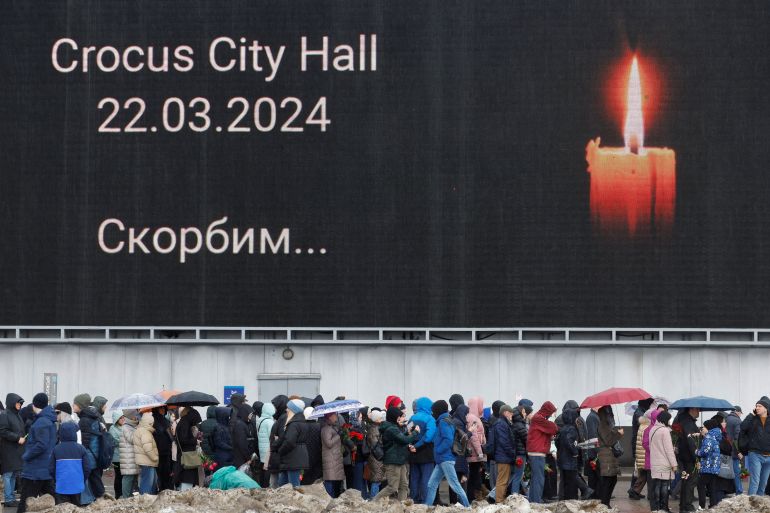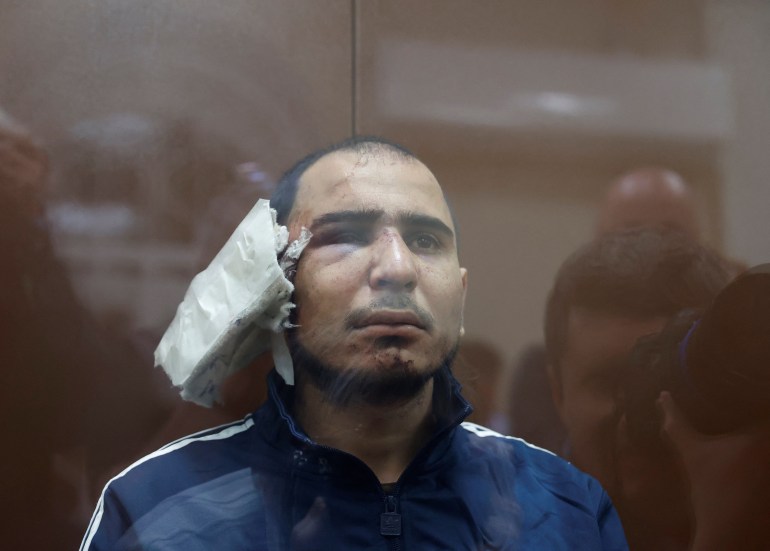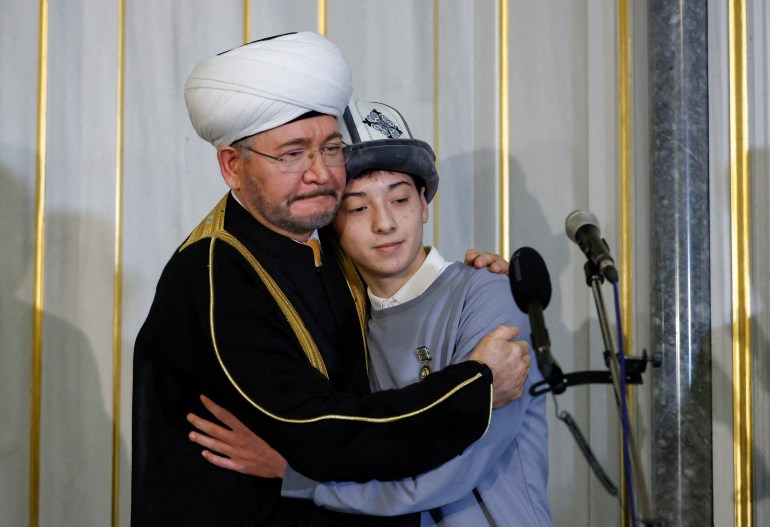After deadly attack, Russia’s Central Asian workers report rising racism
Migrants say they are being collectively punished after Tajik nationals were suspected of last month’s concert hall attack near Moscow.

Assel Asanbayeva has worked in Russia since 2019, having arrived in Moscow from her native Kyrgyzstan in Central Asia.
She’s been a dishwasher, a waitress and a cleaner to support her two children, paying up to half her salary to an agency that links her to clients.
Keep reading
list of 4 itemsPutin says ‘radical Islamists’ behind Moscow concert hall attack
Nine detained in Tajikistan in relation to Moscow concert hall attack
Russia mulls labelling queen of Soviet pop Pugacheva a ‘foreign agent’
On March 23, she was assigned to clean a recently renovated apartment.
It was the day after the attack at Crocus City Hall, a popular music venue on the northern outskirts of Moscow, during which at least 139 concertgoers were killed by gunmen affiliated with the Afghan branch of ISIL (ISIS).
Eleven suspects were apprehended by security forces, all of Central Asian background – mainly Tajik but also one of Kyrgyz origin, who had reportedly renounced his Kyrgyzstan citizenship in 2014.

Since then, xenophobia has mushroomed.
“It started from the very morning,” Asanbayeva told Al Jazeera by phone. “There were two of us, me and another girl. The lady of the house was yelling at us, standing behind us, pressing us psychologically. As the day went on, she kept raising her voice, threatening us.”
The client threatened the pair, saying her husband would “show all you non-Russians” before trying to attack them.
“As the day was coming to a close, my partner was telling her, ‘We’re almost finished. No need to stress.’ And then I saw her lunge at my partner with a screwdriver. At that moment, her husband walked in. He was a huge man, around 50 years old. He said, ‘I’m giving you three minutes to step off my private property.’ We were still covered in soap and wearing our work clothes, and we had to change outside.”
Officially, there are about 10.5 million migrants from Uzbekistan, Tajikistan and Kyrgyzstan in Russia, many in low-paid jobs, such as taxi drivers and construction workers.
The remittances they send home are significant for Tajikistan, the poorest nation in the former Soviet Union. In December, remittances made up nearly half of its gross domestic product.
In the 1990s and 2000s, Central Asians and other ethnic minorities regularly endured violent racism, often accused of being narcotics peddlers by thuggish vigilantes. Some were stabbed, beaten and killed by neo-Nazi gangs.
Neo-Nazi violence peaked in 2008 with more than 100 racially motivated murders. This trend declined by the 2010s as the authorities took a tougher line.
But discrimination persists.
Valentina Chupik, a lawyer who offers free legal help for migrants, listed the abuses her clients endure on a daily basis.
“The police robbed, extorted bribes and illegally detained people on the streets, in public transport and other public places,” she said. “They illegally broke into homes, carried out illegal ‘checks’ at work, illegally imprisoned people in torturous conditions – without food, water, toilet access or communication in unheated, unventilated, cramped premises or even in the courtyards of police stations.”
Chupik said they also falsified “non-existent administrative offences” to justify their actions against migrants “or to deprive their ability to promptly appeal crimes against them”.
Since last month’s attack, police are accused of ramping up racial profiling, conducting checks and raiding hostels hosting guest workers.
The day after the concert hall attack, dozens of Kyrgyz men were detained at Moscow’s Sheremetyevo International Airport and reportedly held without any food or water for 24 hours.
Meanwhile, the owners of a shopping mall in Yekaterinburg, Russia’s fourth largest city, requested all businesses on the premises provide a list of their Central Asian employees.
“The authorities cover up and encourage police crimes against migrants, slandering migrants with myths about dirty, infectious, uncultured, unskilled, uneducated criminals, inflating migrantphobia in order to distract the population from the real problems created by the authorities,” Chupik told Al Jazeera.
“The population is willingly led to any xenophobia since they are too afraid not only to speak out against the authorities but even to think about who is really to blame for their problems so as not to take any civil responsibility for their lives and their government.”
‘We Asians are used to it’
Shamil, a 42-year-old from Kyrgyzstan, said the level of discrimination does not feel new to him.
“We Asians are used to it,” he told Al Jazeera. “Nowadays, Asians are leaving to Europe and the United States for work, and Russian employers are trying to hire from other countries and continents like Africa, Vietnam, Philippines.”
Russia’s has long offered Central Asians visa-free entry, but this has come into question after the March attack.
Sergey Mironov, a Russian politician who leads A Just Russia – For Truth, a party that is sympathetic towards President Vladimir Putin, touted a visa regime on March 25, saying: “It is necessary to regulate migration and counter terrorist attacks.”
The late anti-Kremlin activist and liberal politician Alexey Navalny had also berated Central Asian migrants and called for a visa regime.
“Racism in Russia towards [Central] Asians and Caucasians [people from the Caucuses] happens every day, every godforsaken day,” added Shamil, who worked in Russia in 2005, 2013 and 2019. He is now employed as a truck driver in Western Europe.
The storm of prejudice has engulfed Russians too.
After it emerged that one of the suspects in the Crocus Hall attack, 19-year-old Muhammadsobir Fayzov, worked at a barbershop in the town of Teykovo, northeast of Moscow, its employees began receiving death threats.
A widely circulated screenshot of a text conversation with a taxi driver read: “Hello, if you are Tajik, cancel the order, I will not go with you, or I will call the traffic police. Let them check your licence to transport passengers.”
Tajik residents in Moscow have complained about being suddenly evicted.
In a town on the Chinese border, a drunken man reportedly set fire to a stall manned by migrant workers.
The Kyrgyz Ministry of Foreign Affairs has even warned its citizens against travelling to Russia and urged those already in the country to carry their papers with them.
For his part, Putin has urged unity.
Days after the attack, he said: “We must never forget that we are a multinational, multireligious country. We must always treat our brothers, representatives of other faiths, with respect as we always do – Muslims, Jews, everyone.”
Russian media have lauded Islam Khalilov, a boy from a Kyrgyz immigrant family, as a hero for his response to the Crocus City Hall attack as well as his co-worker 14-year-old Artem Donskov.
Khalilov, a 15-year-old schoolboy, was working as a cloakroom attendant at Crocus when the attack began and led terrified guests through the corridors to emergency exits and safety, saving dozens of lives.

But this is all little comfort to Asanbayeva.
“[Racism’s] gotten worse, 100 percent,” she said.
“It’s a good idea to have 20,000 roubles ($215) on hand just in case you must quickly buy tickets and fly away. I’d leave right now, but it’s not so easy. I’ve got two children and my mother to support. I’d like our embassy to pay attention to these incidents and help our citizens because our embassy hardly does anything. It’s upsetting when you’re in Russia. You obey all the rules, and they still treat you like I don’t know what.”